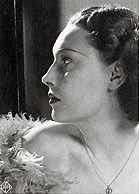 | Documents on the Life and Times of Dr Joseph Goebbels The Nazi Propaganda Minister (and Hitler's one-day successor as Chancellor) Death of Lida Baarova at 86 ALL Photos: From David
Irving, Goebbels. Mastermind of the Third Reich (Focal
Point, London, 1996). |
October 30, 2000 Ufa-Star Lida Baarova gestorben Drehverbot wegen Verhältnis mit Joseph Goebbels Salzburg -- Die tschechische Filmschauspielerin Lida Baarova, ist am Freitag im Alter von 86 Jahren in Salzburg gestorben. Mit 20 erhielt sie ihren ersten Vertrag mit der Ufa und wurde praktisch über Nacht ein Star. In Unterhaltungsfilmen wie "Barcarole" (1934), "Die Stunde der Versuchung" (1936) und "Der Spieler" (1938) gewann die Schauspielerin die Herzen des Publikums. Dann wurde ihre Affäre mit Goebbels publik, und sie erhielt Drehverbot in Deutschland. Nach Kriegsende wurde Lida Baarova wegen Kollaboration in
der Tschechoslowakei eineinhalb Jahre inhaftiert. Zu Beginn
der Fünfziger wurde die Schauspielerin vom
italienischen Film wiederentdeckt, und gehörte u.a. zum
Ensemble von Federico Fellinis erstem Meisterwerk
"Die Müßiggänger" (1953).
Die Welt October 20, 2000 When Lida met Joseph Eine Affäre im Dritten Reich -- Glosse Von Frank Noack
In 60 Filmen ist sie über fast 30 Jahre aufgetreten, aber es war das dreijährige Gastspiel in Nazi-Deutschland, das die Phantasie anregte. Als das Gerücht kursierte, ihr Lebensgefährte Gustav Fröhlich habe Goebbels aus Eifersucht geohrfeigt, sang der Kabarettist Werner Finck: "Wer möchte nicht mal Fröhlich sein?" Veit Harlan, dem Goebbels eine Scheinehe mit Baarova aufdrängen wollte, spiegelte den Konflikt in einem Film: In "Die Reise nach Tilsit" (1939) will ein deutscher Fischer seine Frau wegen einer schönen Polin verlassen, und diese Polin wird nicht als Eindringling, sondern als ernsthafte, reizvolle Alternative zur hausbackenen Ehefrau gezeichnet. Harlans Sohn Thomas behauptet in seinem gerade erschienenen Schlüsselroman "Rosa", er und seine Schwester hätten das Kinderzimmer räumen müssen, damit der Minister und seine Geliebte darin. . . Nein, das ist nun wirklich Nazi-Kolportage. Wie auch
immer: Lida Baarova war einer der berühmtesten "Was
wäre wenn"-Fälle des 20. Jahrhunderts. Man stelle
sich vor: kein "Jud Süss", kein "Totaler Krieg", keine
Durchhaltefilme. . .
 October 30, 2000 Süße Bitterkeit Zum Tod der Ufa-Filmdiva Lida Baarova SIE gehörte zu jenen Stars, für die das Leben eine Rolle bereithielt, die schwieriger, härter, undankbarer war als all jene, die sie auf der Kinoleinwand hatte. Dabei hatte Lida Baarova, geboren als Ludmilla Babkova am 7. September 1914 als Tochter eines Beamten in Prag, sehr schnell, sehr früh Erfolg gehabt -- am Prager Nationaltheater, dann, mit siebzehn, in diversen Kinostücken. 1934 kam der große Vertrag mit der Ufa, es entstanden Filme wie „Barcarole", 1935, „Ein Teufelskerl", „Die Stunde der Versuchung", 1936 -- alle drei mit Gustav Fröhlich, mit dem sie damals sehr eng befreundet war. Schnell trat dann der andere Mann in ihr Leben, der Nazi-Minister Joseph Goebbels, der aus der Liebe zu ihr eine etwas verdruckste, eigentümlich pubertäre Show machte -- Baarova hat erst 1991 selbst in einem Fernsehinterview davon erzählt: Seinen Posten wollte Goebbels aufgeben für sie und weggehen mit ihr, zu welchen Bedingungen auch immer -- „und wenn er Krawatten verkaufen müsste in Japan". Ein paar Filme hat Baarova bei der Ufa noch machen können, darunter „Verräter", 1936, „Patrioten", 1937, „Der Spieler", 1938, dann sprach der Führer selbst ein Machtwort und schickte, in einer billigen Imitation absolutistischer Herrschergewalt, die Mätresse seines Ministers ins Exil -- „Drehverbot". Ein harsches Ende, eine traurige Episode -- und die Tristesse setzte sich fort nach dem Krieg -- nun hatte Baarova an der engen Beziehung zu den Nazis zu leiden -- das Drehverbot blieb fürs erste bestehen, an eine wirkliche Karriere war nicht zu denken. Es gab eineinhalb Jahre Gefängnis wegen Kollaboration mit den Deutschen, einen gescheiterten Fluchtversuch, 1948, schließlich die Ausreise, offiziell genehmigt, es folgten Aufenthalte in Österreich, Argentinien, Spanien. Zu Beginn der fünfziger Jahre wurde Lida Baarova vom
italienischen Film wiederentdeckt, auch in Spanien gab es
kleine Rollen für sie. Comeback-Versuche auf deutschen
Bühnen scheiterten, unter anderem in einer
Bühnenfassung von Fassbinders „Die bitteren
Tränen der Petra von Kant". So wird die einst
glamouröse Lida Baarova wahrscheinlich in Erinnerung
bleiben als Giulia in Fellinis
„Vitelloni" -- eine Rolle, die ihre Goebbels-Romanze
tragikomisch karikiert: eine Kaufmannsfrau, ihr Mann handelt
mit mystisch religiösem Kram. Was hätte sie dem
Neorealismus, dem Kino der Fünfziger bringen
können . . . Am Freitag ist Lida Baarova im Alter von
86 Jahren in Salzburg gestorben. Der Verlag Kettermann +
Schmidt will bald ihre Erinnerungen herausbringen: „Die
süße Bitterkeit des Lebens". |
I AM SORRY to hear from the newspapers that Lida Baarova has died. She was an intimate friend of the Nazi propaganda minister, Dr Joseph Goebbels, and one of Germany's most beautiful and popular film stars before that. It is seven years since I interviewed her for GOEBBELS. MASTERMIND OF THE THIRD REICH. I tried to once before, in January 1993. It was a day or two after the German government fined me DM30,000 in Munich under their laws for the suppression of free speech (plus ça change!), because I had said that the gas chamber shown to tourists at Auschwitz is a post-war fake (which the Polish government now admits is true). On that occasion, in
January 1993, Lida's housekeeper told us that she had been
taken to the
ONE OF the last
photographs of
The nurse said we could go in and see her if we wanted, but my instinct told me that an actress who had once been one of the most glamorous film stars in Europe would not want to be interviewed while hooked up to cables and tubes of another sort. I said we would return some months later, when she was better.
On this occasion, I was being trailed around Germany by a journalist of Finland's biggest newspaper, Helsingin Sanomat, who was writing a feature article. For various reasons I suggested that I leave my car parked in Munich, and that she and her photographer drive me down over the border into Austria; I had to explain that the Austrian government had in 1989 issued an Interpol arrest-warrant for me after a lecture tour ended in riots organised by the traditional enemies of free speech, so I might not make it very far through the border. Ghoulish as such journalists are, they had their cameras at the ready as we went through the border. Sure enough, we were halted and hauled out of the line, and my papers were taken away for fifteen minutes. Then the border police returned and waved us through with smiles. It seems that the Austrian government had only issued the "warrant" pro-forma, to satisfy certain international organisations who kept breathing down their neck.
"It lasted from September 1936 until August 1938, just two years?" I began, trying to fix the dates of these events. The real question would be the most delicate, and I was at a loss really as to how to put it: had she really had sexual relations with the minister, or not, and if so for how long? Much depended on establishing the truth of this matter. My research to that point, and my discussions with the daughter of his first love Anka Stalherm, had suggested that he was mostly flash and not much bang, like one of those distant thunderstorms above the clouds, or beyond the horizon -- that the great Casanova had in fact not had his first sexual relations with a woman until he was aged around 36 -- relatively late in life, even in those times; and that his relations with other girls had been confined until then to hand-holding, and the occasional kiss on the cheek. I had good reasons for holding these beliefs. After a while one becomes practiced in the reading of private diaries, and one knows what hidden clues to look for, and how to interpret them. Readers of my biography will know what those clues in fact were. Over the hour or so of our discussion, while the Finns sucked their teeth impatiently, having snapped the pictures that they wanted, Lida told me a sweet and romantic tale of the minister's infatuation with her, and of hers with him (she was just 21). Those chapters are the happiest of my biography, in my view. They wrote themselves (any writer will know what I mean by that phrase). They had driven out to the cottage he built for her on a lakeside near Berlin (it is still there today, if you know where to look). He played the piano, and she lay on a couch listening to his music and reading all evening. The manservant fixed a simple meal for them. In the morning -- they slept in different rooms, she confirmed -- the chauffeur would take them back to the city, she to the studios, he to the propaganda ministry. She could not recall how long they had been really intimate, whether it was weeks or months or days. She seemed forgetful rather than evasive. Right at the end, I asked a question which just occurred to me. "Didn't his leg brace bother you, when you were making love?" I asked. The minister had a deformed foot, and he wore a steel and leather leg brace almost all the time. "Leg brace?" she asked in astonishment. She had never seen one. In a way, that provided all the answer that I needed.
David Irving interviews Lida Baarova, 1993, for his biography of Dr Joseph Goebbels [photo: Helsingin Sanomat, Helsinki]
|
Lida Baarova on Dr Goebbels (in German): Goebbels' former mistress, the famous film actress, recounts her life and times with Goebbels. Watch for the five minutes which Westdeutscher Rundfunk insisted she tack on at the end, adding criticisms to her too-positive account. |
 60
JAHRE vor Monica Lewinsky gab es Lida Baarova.
Auch sie hat eine Staatskrise ausgelöst, nur weil sie
die Geliebte eines hochrangigen Politikers war. Doch anders
als bei Ms Lewinsky darf man sich seine Gedanken
darüber machen, ob Frl. Baarova nicht wirklich den Gang
der Geschichte beeinflussen hätte können. Ihr
Politiker hieß Joseph Goebbels. Seine
Affären, bevorzugt mit slawischen Schönheiten,
trugen ihm den Spitznamen "Bock von Babelsberg" ein. Aber
Lida Baarova war mehr als eine Affäre. Der Minister
dachte ernsthaft daran, sich von seiner Frau Magda
scheiden zu lassen und seinen Posten niederzulegen. Das ging
Hitler zu weit, und er intervenierte persönlich. Also
wurde die Baarova 1938 des Landes verwiesen.
60
JAHRE vor Monica Lewinsky gab es Lida Baarova.
Auch sie hat eine Staatskrise ausgelöst, nur weil sie
die Geliebte eines hochrangigen Politikers war. Doch anders
als bei Ms Lewinsky darf man sich seine Gedanken
darüber machen, ob Frl. Baarova nicht wirklich den Gang
der Geschichte beeinflussen hätte können. Ihr
Politiker hieß Joseph Goebbels. Seine
Affären, bevorzugt mit slawischen Schönheiten,
trugen ihm den Spitznamen "Bock von Babelsberg" ein. Aber
Lida Baarova war mehr als eine Affäre. Der Minister
dachte ernsthaft daran, sich von seiner Frau Magda
scheiden zu lassen und seinen Posten niederzulegen. Das ging
Hitler zu weit, und er intervenierte persönlich. Also
wurde die Baarova 1938 des Landes verwiesen. Key
West, Tuesday, October 31, 2000
Key
West, Tuesday, October 31, 2000  hospital
a few days earlier; we drove round to the hospital, and I
left the bouquet of flowers that I had brought for her.
hospital
a few days earlier; we drove round to the hospital, and I
left the bouquet of flowers that I had brought for her.

